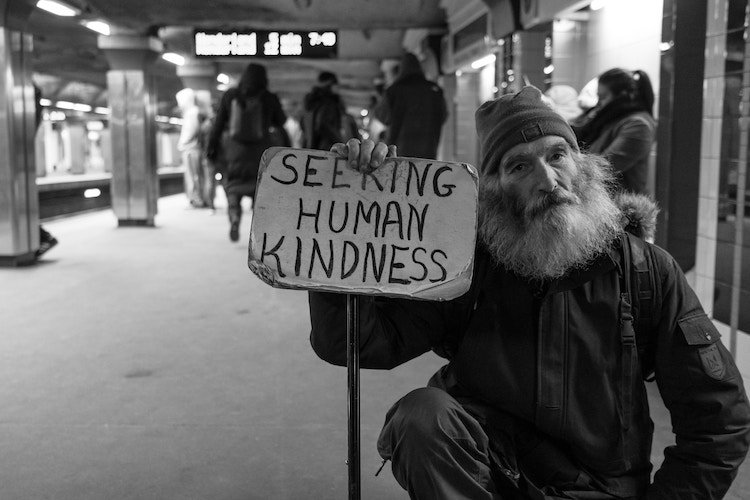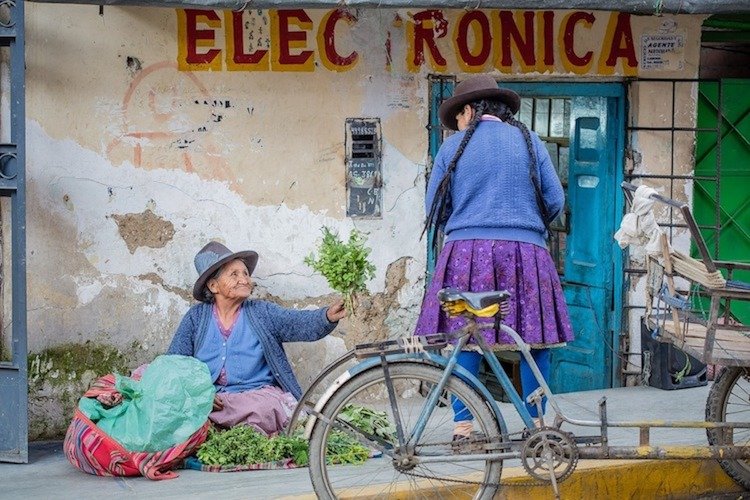From boosting your mood to lowering stress, the power of kindness is real. In fact, science shows the benefits of being kind are greater for the giver than the receiver. So, as Calvin Holbrook suggests, help others and help yourself, too.
Can you remember the last time a stranger was kind to you? Maybe someone held a door open or offered you help with directions in the street? Or, perhaps you can recall the last time you helped somebody. After recently carrying out a few altruistic acts myself, I wanted to find out more about the power and benefits of kindness.
Just before Christmas I passed a homeless man sitting outside a London Tube station. Coming out of a nearby coffee shop after paying almost £3 for a flat white, I couldn’t justify spending that on a hot drink while he was sat with nothing.
I started a conversation to find out how he was doing and he was thankful when I offered him some change and a banana. However, he seemed most grateful when I simply asked him what his name was. When I got up to leave, he looked directly into my eyes and gave me a genuine ‘thank you.’
Later that week, I spotted an elderly lady hauling a huge suitcase down some stairs – she was clearly struggling. Her face lit up with joy when I offered a hand. She was clearly touched someone had made the effort to assist, and I too walked away with a spring in my step and smile on my face.
The power of kindness: a ripple effect
In these examples the power of kindness is obvious for the recipient: they were in a moment of need and received assistance. But the power of altruism also extended to me – in fact, one major benefit of kindness is that the love spreads both ways; it’s a win-win situation.
A positive sign: showing kindness is easy and free
After connecting with these people I felt a sense of happiness and pride to know I'd made a small but meaningful impact on their day. In fact, this feel-good sensation stayed with me for hours afterwards. Experiencing this feeling has also made it more likely that I'll carry out more random acts of kindness in the future.
Likewise, I like to think that the power of kindness can potentially rub off on the people you'll help out in the future, so that they, in turn, will be more likely to assist others. In fact, it turns out that science backs up this kindness 'ripple effect'.
“The power of kindness can potentially rub off on other people you'll help out in the future, so that they, in turn, will be more likely to assist other.”
A 2018 study focused on employees at a Spanish company. Workers were asked to either a) perform acts of kindness for colleagues, or b) count the number of kind acts they received from coworkers. The results showed that those who received acts of kindness became happier, demonstrating the value of benevolence for the receiver.
RELATED:
However, those who delivered the acts of kindness benefited even more than the receivers. That’s because not only did they show a similar trend towards increased happiness, but they also had an boost in life and job satisfaction, as well as a decrease in depression.
Furthermore, the effects of altruism were contagious. Those colleagues on the receiving end of the acts of kindness ended up spontaneously paying it forward, themselves doing nice things for other colleagues. This study suggests the ripple effect really is one of the benefits of being nice.
Kindness and psychological flourishing
Further studies back up the power of kindness. In another, researchers asked members of the public to either perform acts of kindness – such as opening doors for strangers – for one month, or to perform kind acts for themselves, such as treating themselves to a new purchase.
The researchers measured the participants’ level of so-called ‘psychological flourishing’ – their emotional, psychological, and social well-being at the start and end of the experiment. By the end, those who had carried out kind acts for others had higher levels of psychological flourishing compared to those who acted kindly towards themselves. Kindly acts also led to higher levels of positive emotions.
MORE LIKE THIS:
- Kindness: A Peak Inside the Power of This Simple Action
- Why Do People Volunteer?
- Human Kindness: Why We Need It More Than Ever
Meanwhile, another study incorporated cold hard cash to test the powers of altruism. Researchers gave participants either $5 or $20 which they had to spend on themselves or others before the end of the day. They measured the participants’ happiness levels before giving them the money and then called them on the phone in the evening. The results? Those who had spent the money on others were happier than those who'd used the money for their own needs.
The physical effects of kindness
So, science shows that being kind and helpful clearly has a positive and uplifting effect on those carrying out the act. But what exactly is happening in the body? Here are four ways keys in which the physical benefits of kindness can be felt:
1. Kindness releases feel-good hormones
When you do kinds acts for other people, so-called happiness hormones are released, boosting your serotonin, the neurotransmitter responsible for feelings of well-being and satisfaction. Endorphin levels also rise, leading to a phenomenon known as a 'helper’s high'.
2. Kindness can reduce anxiety
Another physical benefit of kindness is that it can help to lower anxiety. Social anxiety is associated with low positive affect (PA), which relates to an individual’s experience of positive moods such as joy, interest, and alertness. A four-week study on happiness from the University of British Columbia found that participants who engaged in kind acts displayed major increases in their PA levels that were maintained during the study duration.
 Good to give: kindness benefits both the giver and receiver
Good to give: kindness benefits both the giver and receiver
3. Kindness may help alleviate certain illness
Inflammation in the body is linked to numerous health problems including chronic pain, diabetes, obesity, and migraines. For older generations at least, volunteering as an act of kindness may be of benefit to reduce inflammation. In fact, according to one study of older adults aged 57-85, “volunteering manifested the strongest association with lower levels of inflammation.”
Additionally, oxytocin, also released with acts of kindness, reduces inflammation, and it can directly affect the chemical balance of your heart. According to Dr. David Hamilton, “oxytocin causes the release of a chemical called nitric oxide in blood vessels, which dilates the blood vessels. This reduces blood pressure and therefore oxytocin is known as a ‘cardioprotective’ hormone because it protects the heart (by lowering blood pressure).”
4. Kindness can reduce your stress levels
Helping others takes you out of your own mind and can potentially help to build relationships with other people. Anything that helps you to build bonds with other people is known as 'affiliative behavior'.
And, according to one study on the effects of pro-social behavior — action intended to help others on stress, “affiliative behavior may be an important component of coping with stress and indicate that engaging in pro-social behavior might be an effective strategy for reducing the impact of stress on emotional functioning.”
“Science and studies show that being kind and helpful clearly has a positive and uplifting effect on those carrying out the act.”
Furthermore, once we establish an 'affiliative connection' with someone — a relationship of friendship, love, or other positive bonding — we feel emotions that can boost our immune system. So, it seems continued altruism can boost your happiness and improve relationships and connections, in turn indirectly boosting your health.
Shifting to kindness
So, knowing this, why aren't people benefiting from the power of kindness? Why aren’t more people making a conscious effort to change the lives of others?
RELATED:
For one, in our fast-paced world, benevolence and compassion often end up taking a back seat to self-interest – and selfies. People don’t seem to take the time to stop and help others or even notice what’s going on as we're often wrapped up in our own lives.
Helping hand: the power of kindness is proven
Also, some people believe that showing kindness and compassion is a weakness and will only lead to being taken advantage of. But, the truth is, it’s in our human DNA to show kindness. In fact, we’re the only mammals with an extended gestation period, and while other animals rely on support for a short period before becoming self-reliant, we depend on the care of our caregivers to provide our needs. Indeed, kindness is fundamental to the human existence – we're literally wired for it.
Kindness is not something that demands hard work or huge amounts of time. It’s something all of us can strive to achieve every day. And, knowing that the power of kindness and its benefits are immense for ourselves and not just the receiver, why wouldn’t you want to help others more? ●
happiness.com | The fine art of being: learn, practice, share
Are you a happiness.com member? Sign up for free now to:
■ enjoy our happiness magazine
■ share and support in our happiness forum
Written by Calvin Holbrook
 Calvin is the happiness.com magazine editor, as well being an artist and lover of swimming, yoga, dancing to house/techno, and all things vintage! Find out more.
Calvin is the happiness.com magazine editor, as well being an artist and lover of swimming, yoga, dancing to house/techno, and all things vintage! Find out more.




Join the conversation
You are posting as a guest. If you have an account, sign in now to post with your account.